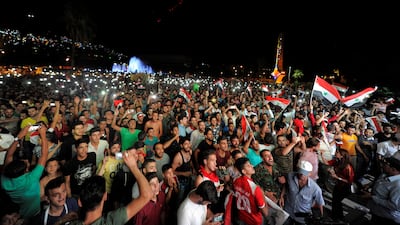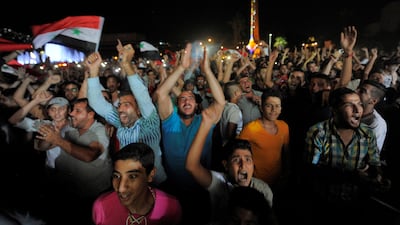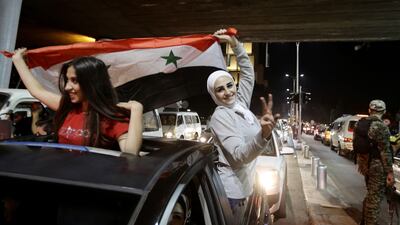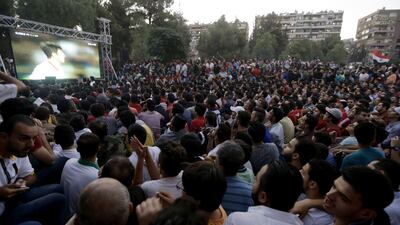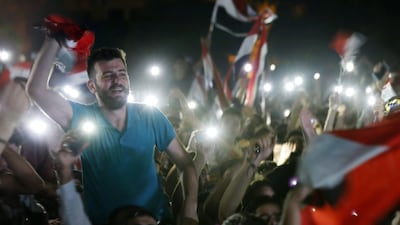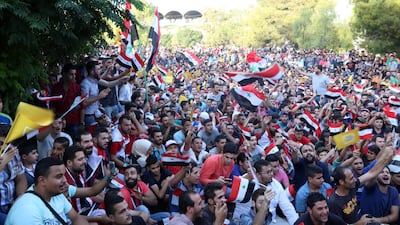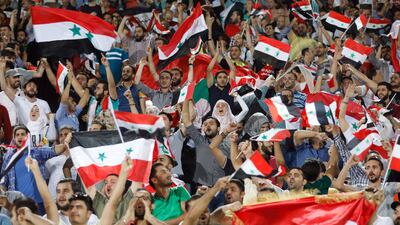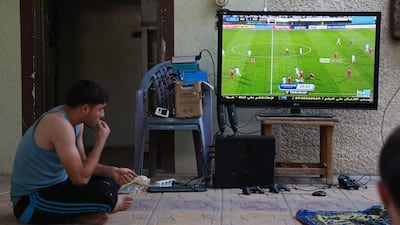As a display of unity, it was emphatic. As he turned towards the touchline of Tehran’s Azadi stadium on Tuesday night, his firm angled shot having slipped past the right hand of Iran’s goalkeeper and rippled the net, Omar Al Soma was quickly at the bottom of a large hill of wriggling bodies.
His teammates felt exhausted. There were 92 minutes on the clock. Still most of them sprinted to pile on top of him. So did most of the substitutes, in their lime-green bibs. Coaching staff, young and old, followed onto the pitch, exuberant.
Syria, improbably, had just made it to the outskirts of a first ever World Cup thanks to Al Soma's stoppage-time equaliser, sealing a 2-2 draw away against Iran.
READ MORE:
Edgardo Bauza: 'Give me UAE job earlier and we would have had great chance to reach World Cup'
Ange Postecoglou: Australia will bounce back against Syria in World Cup play-offs
John McAuley's analysis: Depleted UAE ran out of steam and ideas against Iraq
That same night, as Al Soma would soon learn, there had been a breakthrough on the outskirts of his home city, as least as it was proudly reported by the Syrian government. The army had broken the long ISIL siege around Deir Ezzor, a potential strategic turning point in the attritional, bloody Syrian civil war.
Al Soma was born in Deir Ezzor 28 years ago and has family there. He, like the millions of Syrians displaced over the last six years of violence, has a complicated relationship with the place he calls home. He is blessed in as far as his talent has made him a good living abroad, in his case Saudi Arabia, where his all-round game – he takes good free-kicks, is strong in the air, and cool as a finisher – has made him a prolific scorer for Jeddah’s Al Ahli.
Those gifts had not been available to his national team for most of the last five years, a period in which some prominent Syrian footballers have refused to represent a national team they deem to be too strongly associated with Bashar Al Assad’s oppressive regime.
It is a period in which the withdrawal of good players ranks as one factor among many on the list of impediments to success. Because of the security risks, Syria cannot play home games at home; because of sanctions against the Assad state, they cannot receive the usual stipends from Fifa that support international matches.
Al Soma, who maintained a discretion about his long absence from the national team, returned to the squad last month after a four-and-a-half year gap. He took part in the 3-1 win over Qatar in Malaysia – where Syria have been playing ‘home’ games – that carried the team to an apparently impossible threshold.
That victory, plus the draw with an already-qualified Iran, means Syria face a two-legged play-off next month against Australia to become the fifth and last Asian candidate left on the road to Russia. After that, there would one more hurdle: a November play-off against a team from North and Central America. It’s possible that could be the USA.
It is hard to disconnect the story of Syria’s footballers, stoic, heroically overcoming obstacles to go within touching distance of a World Cup place, from the geo-politics of their time: a possible match against a US engaged in military against the Assad regime for a place at a World Cup in the Russia that is probably Assad’s most powerful backer.
It has for many years been hard, too for the man who captained Syria against Qatar and Iran to separate his sport from his country’s politics. Firas Al Khatib, 34, had been a vocal critic of the government through his six years of exile from the national team. But earlier this year, he came back from a long spell in Kuwaiti club football to his native city of Homs, and to a Syrian league that has continued to function through the war, albeit in a limited number of cities.
Al Khatib has heard and read a great deal of criticism of his choice to return to the national team coming from the many Syrians who view the success as a vehicle for the regime to exploit for propaganda purposes.
“I hope I can let the Syrian people be happy,” Al Khatib told ESPN earlier this year. He now finds himself among a minority in the squad who play club football in Syria, and knows his return there has been taken as an endorsement of ‘normality’ resuming.
From Damascus, and the headquarters of the Syrian FA, that idea is encouraged. There is talk of sufficient progress, politically, and militarily that the national team might even play an official match in their own country next year.
That seems far-fetched. But then so did the idea that Syria might reach a stage where they are a couple of goals from making their first ever World Cup, during the most brutal period of the country’s modern history.

